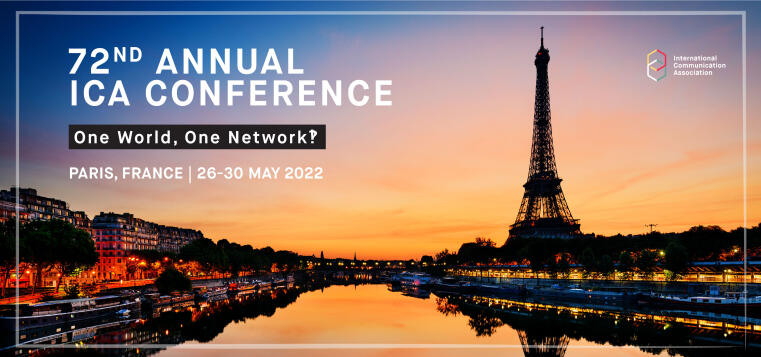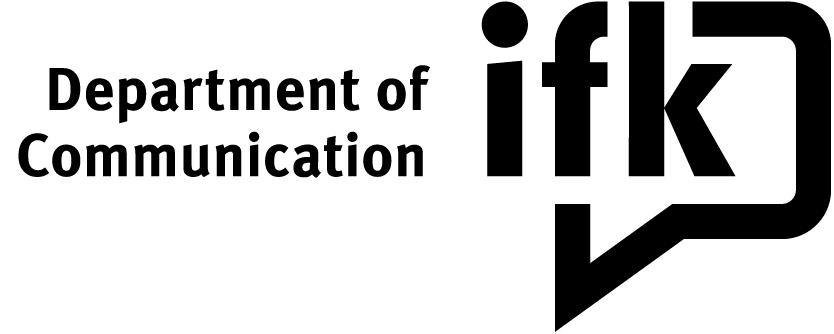
IfK researchers* represented with 35 contributions at the 72nd annual conference of the ICA
(23.05.2022) This year's 72nd annual conference of the International Communication Association (ICA) focuses on "One World, One Network‽" and will take place from 26.-30. May for the first time after the corona pandemic in presence in Paris. Researchers from the Institute for Communication Science are represented with 35 contributions there.
This year's ICA annual conference in Paris deals with the question "One World, One Network‽" and invites to redefine communication science under the conditions of globalization and worldwide networks. The use of the interrobang glyph (an overlay of the exclamation and question mark) in the title attempts to represent the "unity" in this theme.
The distribution of the internet, social media and mobile technologies are generating a debate about the promises and dangers of globalization. However, networks offer impressive metaphors, theories and analytical tools that help scientists to understand communication processes and structures while tackling current issues such as cyber-attacks, disinformation, exclusion, extremism, hate, oppression, polarization and racism.
Due to the corona pandemic, the annual conference was held in online format two years in a row. This year, for the first time, more than 2,100 communication scientists from all over the world will gather in Paris under the motto "Best.Reunion.Ever".
With the various pre- and post-conferences, the conference will take place from May 26th to 30th. Among the papers accepted for this year's conference are 35 papers by or with the participation of IfK researchers:
Conferences
- Behavior Follows Function? The Functional Inventory of Online Platforms from a Communication Ecology Perspective. J. Jünger; M. von Berg
- BLUE SKY WORKSHOP: Broadening Participation in Environmental Communication Research. B. Takahashi; J. Thaker; S. Comfort; J. Metag
- Cognitio Populi – Vox Populi: The Implications of Science-Related Populism for Communication Behavior. N.G. Mede; M. Schäfer; J. Metag
- Coordinated Online Communication: An Approach to Detect Overt, Semi-Overt and Covert Coordination in Telegram Chats. C. Gärtner; J. Jünger
- Diverse News Fed Into the Newsfeed?: Identifying Article Characteristics That Influence the Selection of News Presented on Journalistic Fanpages in Social Media. L.O. Wehden
- Engaging the Public or Asking Your Friends? Analyzing Science-Related Crowdfunding Using Behavioral, Survey, and Content Analysis Data. V. Hase; M. Schäfer; J. Metag; M. Bischofberger; L. Henry
- Gaming in Times of COVID-19: A Study Based on Self-Determination Theory. F. Reer
- Global Warming’s Five Germanys Reloaded: A Segmentation of the German Population in Context of International Research. K. Klinger; J. Metag; M. Schäfer
- High Quality, Close to the Audience and Transparent: How German News Outlets Try to Build Trust in Their Work. B.S. Uth
- Investigating the Journalist-Audience Relationship in the Digital Age: A Multi-Stage Research Project. C. Wilhelm; H. Detel; N. Podschuweit; H. Stehle
- Journalism in the Matrix of Mediatization- T. Birkner
- Journalism Studies Division Business Meeting, Business Meeting, Journalism Studies. S. Lewis; A. Sehl; M. Karlsson; E. Rinke; N. Springer; C. Vaccari; S. Waisbord
- Keynote / Wrap-up-talk: Post-Truth and Affective Publics’ Challenges to Social Ties. Disinformation, Populism, Data-Driven Propaganda. T. Quandt
- Linking News Use on Social Media to Conspiracy Beliefs: A Cross-Platform Linkage Study of German Media Users. T. Schatto-Eckrodt; L. Clever; L. Frischlich
- Media Friends Vs. Media Skeptics: How Personality and Media Performance Influence Trust in the Media. B.S. Uth; B. Blöbaum
- “My Memes Are Ironic – My Depression Is Chronic”: An Analysis of Depression Memes on Instagram. A. Wagner; L.J. Temmann
- “On the Tour, They’re Always Sticking a Microphone in Your Face”: Mediatization of Professional Tennis From the 1980S to the 2010S. L. Küpper; G. Kossing; T. Birkner
- Picture Me in Person: Personalization and Emotionalization as Political Campaign Strategies on Social Media in the German Federal Election Period 2021. S. Geise; K. Maubach; A. Boettcher Eli
- Populists Reliance on Nostalgia: A Supervised Machine Learning Approach. L. Frischlich; L. Clever; T. Wulf; T. Wildschut; C. Sedikides
- Responsibility Framing of Diabetes and Depression by Social Media Influencers. Wiedicke; D. Reifegerste; L.J. Temmann; S. Scherr
- Social Media Use and Engagement, Knowledge Overestimation, and Populism Fuel Each Other During the COVID-19 Pandemic: Correlational and Experimental Evidence From Germany and Taiwan. N.G. Mede; A. Rauchfleisch; J. Metag; M. Schäfer
- Strengthening Local Administrations’ Perceived Trustworthiness Through Public Relations: Effects of Media Use and Sociopsychological Factors. L.A. Rettler; N. Löffler; A. Dudenhausen; U. Röttger
- Sourcing Dis/Information: How Swedish and Ukrainian Journalists Source, Verify, and Mediate Journalistic Truth on the Russian-Ukrainian Conflict. N. Springer; G. Nygren; D. Orlova; D. Taradai; A. Widholm
- Talking the Talk but Not Walking the Walk: A Study of ICA Presidential Addresses. C. Pentzold; A. Seikel; E. Koenen; J. Jünger
- The Online Communication Disinhibition Model: Toward a Holistic Understanding of Benign and Toxic Online Communication. N. Springer; C. Brantner; C. Wilhelm; I. Engelmann; H. Stehle; H. Detel; K. Lobinger
- The Perception of Issue-Specific Coverage and Trust in News Media: Examining the Influence of Hostile Media Perceptions and Credibility. F. Wintterlin; G. Gurr; J. Metag
- The Process of Media Inspiration: A Scoping Review. L. Frischlich; L. Hahn; D. Rieger
- Tool Demo: twCompliance. T. Schatto-Eckrodt
- Two Decades of Journalism Studies: Changes in and Impact of Diversity Across Authorship. T. Schatto-Eckrodt; T. Quandt
- Typologizing the Swiss Populations’ COVID-19-Related Conspiracy Beliefs and Their Corresponding Information Behavior and Media Use. D. Mahl; M. Schäfer; T. Füchslin; J. Metag; J. Zeng
- What Leads to Audience Issue Fatigue? A Linkage Analysis Study on the Effects of News Coverage on Fatigue From Ongoing News Issues. G. Gurr; J. Metag
Pre-conferences
- COVID-19 Skeptics’ Attitudes and Expectations Toward Mediated Science Communication. A. Kosyk; A. Kirsten; B.S. Uth; A. M. Scheu
- „I’m Sorry That I Can’t Keep Going“: Reflexive Mediatization in Sport Documentaries.. J.U. Nieland; D. Nölleke; T. Birkner
- Enhancing Critical Media Literacy to Fight Conspiracy Theories: Testing the Effectiveness of Narrative Prebunking Interventions". J. Klapproth; L. Frischlich; T. Quandt
- The Science of Science Communication: Mapping the Field. S. Engesser; S. Kohler; N. Mede; A. M. Scheu; F. Weder; L. Bolz
The International Communication Association (ICA) was founded in 1950 and has been associated with the United Nations (UN) as a non-governmental organization (NGO) since 2003. As a trade association headquartered in Washington D.C. ICA is one of the most important scientific exchange platforms in the field of media and communication research and now has more than 5,000 members from over 80 countries. The next annual conference will take place from May 25-29, 2023, in Toronto, Canada.

